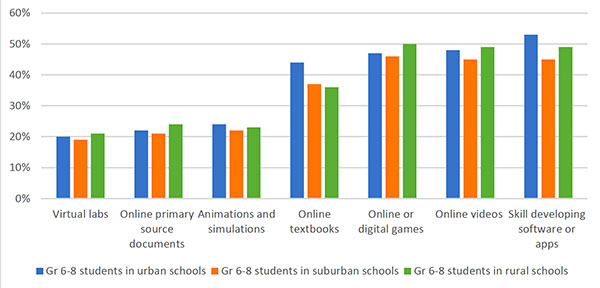How Teachers Use Technology to Enrich Learning Experiences
Through virtual labs, animations and simulations, educators can provide students with opportunities to explore and understand abstract concepts that are difficult to understand without experimentation. However, only one in five middle school students have access to these resources as part of their regular school activities, according to a new report from Project Tomorrow.
When teachers use technology in their classrooms, they are more likely to "mirror or replicate traditional learning modalities such as using a mobile device to take class notes or take a poll," writes Project Tomorrow CEO Julie Evans in the report. She argues that technology features that support the "personalization and contextualization of the learning process can yield better returns and demonstrated value."

Chart shows the weekly usage of digital content by middle school students. Source: Project Tomorrow
Evan's findings come from a survey conducted by Project Tomorrow's Speak Up Research Initiative. Over 343,500 students, parents, teachers and administrators responded to the survey during the 2018-2019 school year. The report also explores the hurdles that educators face when implementing technology tools and concerns over student access to digital tools outside the classroom.
Social media tools to communicate with parents and students and cloud-based collaboration tools are widely used by schools, but school administrators report that game-based learning experiences and flipped learning environments adoption levels are still in the nascent stage. When it comes to emerging technologies such as augmented reality, virtual reality or artificial intelligence, there is a lot of interest, but less than 10 percent of schools are actually using these tools in their learning environments.
Other report findings include:
- Chromebooks are most popular device among schools for students to use in the classroom for assignments.
- Sixty-one percent of high school students are regularly using their own mobile devices to support class-based learning.
- The majority of student (83 percent) say that they use G Suite for Education products to support schoolwork in grades 6-12.
- High school students are using technology tools outside of school that support their academic interests. Some of those activities include reading news stories online (62 percent), tapping into social media channels to learn about what others are doing around a topic of interest (57 percent), playing online or digital games (42 percent), leveraging online writing tools to get feedback for self-improvement (42 percent) and watching TED Talks to learn about people's ideas (41 percent).
The full Project Tomorrow report is available on Project Tomorrow's website.
About the Author
 Sara Friedman is a reporter/producer for Campus Technology, THE Journal and STEAM Universe covering education policy and a wide range of other public-sector IT topics.
Sara Friedman is a reporter/producer for Campus Technology, THE Journal and STEAM Universe covering education policy and a wide range of other public-sector IT topics.
Friedman is a graduate of Ithaca College, where she studied journalism, politics and international communications.
Friedman can be contacted at [email protected] or follow her on Twitter @SaraEFriedman.
Click here for previous articles by Friedman.